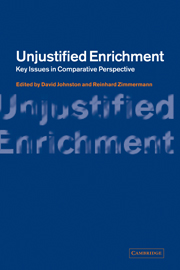Book contents
- Frontmatter
- Contents
- List of contributors
- Preface
- Table of cases
- List of abbreviations
- I Introduction
- II Enrichment ‘without legal ground’ or unjust factor approach
- 2 Unjust factors and legal grounds
- 3 In defence of unjust factors
- III Failure of consideration
- IV Duress and fraud
- V Change of position
- VI Illegality
- VII Encroachment and restitution for wrongs
- VIII Improvements
- IX Discharge of another person's debt
- X Third-party enrichment
- XI Proprietary issues
- XII Taxonomy
- Index
2 - Unjust factors and legal grounds
Published online by Cambridge University Press: 31 July 2009
- Frontmatter
- Contents
- List of contributors
- Preface
- Table of cases
- List of abbreviations
- I Introduction
- II Enrichment ‘without legal ground’ or unjust factor approach
- 2 Unjust factors and legal grounds
- 3 In defence of unjust factors
- III Failure of consideration
- IV Duress and fraud
- V Change of position
- VI Illegality
- VII Encroachment and restitution for wrongs
- VIII Improvements
- IX Discharge of another person's debt
- X Third-party enrichment
- XI Proprietary issues
- XII Taxonomy
- Index
Summary
One of the major differences between the English and Continental law of unjust enrichment seems to be the justification for the claim in restitution. Whereas German law founds the claim on the lack of a legal ground (Rechtsgrund), English claims in restitution are said to rest on a specific ‘unjust factor’, such as mistake, compulsion or failure of consideration. This chapter concentrates on the role of unjust factors and legal grounds in a specific area of unjust enrichment, namely where the claimant willingly conferred a benefit – in particular, money – on the defendant. It does not deal with cases of encroachment, payment of another's debt, improvement of another's property or restitution for wrongs.
Restitution for mistake and the condictio indebiti
Liability mistake and condictio indebiti
The Roman unjustified enrichment claim that attracts the greatest interest today is the condictio indebiti. It required that the claimant conferred a benefit on the defendant in order to discharge a liability that, however, did not exist. The action did not lie when the claimant knew that the liability did not exist. Whether there was also a requirement that the claimant had to be mistaken is disputed. It may be that in classical law a mistake by the claimant was presumed if he performed in terms of a non-existent liability, and that the defendant had to rebut this presumption by showing that the claimant knew that the liability did not exist.
- Type
- Chapter
- Information
- Unjustified EnrichmentKey Issues in Comparative Perspective, pp. 37 - 75Publisher: Cambridge University PressPrint publication year: 2002
- 1
- Cited by



